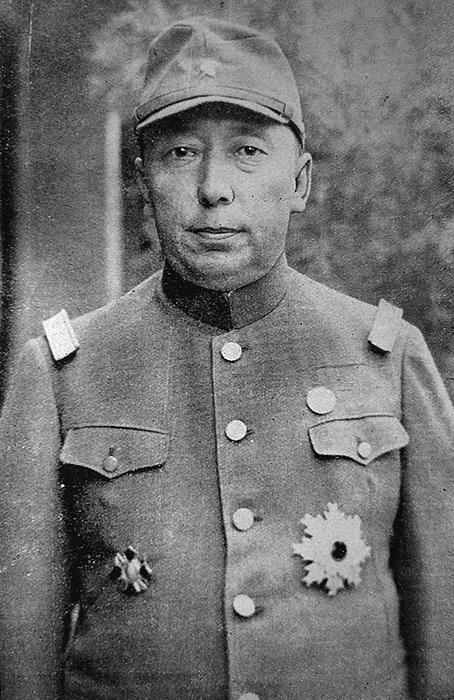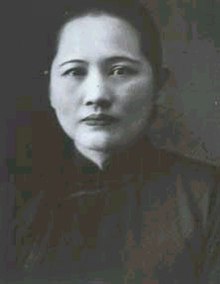July 24th, 1941
Nanking, Republic of China
A nondescript basement
11:38 PM
Soong Chingling:
Li Jishen:
THAT Chiang's leadership had become questionable was undeniable. But, who would do something about it?
China was in turmoil. Even with German training and armament, the National Army was suffering a series of defeats. Chiang refused to listen to anyone who didn't already agree with him; and his repulsive advisor, Eichmann, was often at his side, along with Du Yusheng. Voices of reason, such as Falkenhausen, were shouted down.
Soong Chingling , the widow of Sun Yat-Sen and power-broker in her own right and, Li Jishen, a member of the State Council in the Kuomintang finally met, alone.
"Li, is it as bad as we have feared?" asked a nervous Soong
"Worse" said a distressed Li. "He won't listen to anybody. We pleaded with him not to... he wouldn't listen. Eichmann insisted that now was the time to attack Tsingtao, that the Japanese would break. Of course they didn't! It was a massacre. Thousands dead, and Tsingtao is untouched. Wu, and Sun Chuanfang tried to warn us, but...he would't listen."
"A plague on those traitors too!" hissed Soong. "They would sell us out to the Americans, while collaborating with the Japanese and the British in carving up China. They can call their little Beiyang Clique whatever they like, but they're still the same warlords they always were! That will never change!"
"Bai has defected to them as well. This does not look good" said an even more downcast Li.
"This must end, and end soon" said Soong, with newfound fervor. "Li, who will he listen to?"
"Wang, perhaps" said Li. "Wang will have to make whatever he says sound like it was Chiang's idea in the first place if he'll listen at all though"
Soong nodded. "Wang... I do not entirely trust him yet, but if you could reach out, perhaps we could make some progress. The big question, of course, is would Wang prove strong and convincing enough to sway Mao?"
"That, I am not convinced. He... Wang- drifts farther from revolutionary ideas by the day. He wears the cloak of such thought to confound supporters of Mao"
"We don't need him necessarily" said a frustrated Soong. "But if the Revolutionary True Kuomintang is not to die in the darkness of this damp cellar, we must find more allies. We will need them across the Left and Right. Above all, they must remember what Dr. Sun lived and died for. Chiang has forgotten, and that is why we are in this mess."
---
Tokyo, Empire of Japan
Army Ministry
9:34 PM
Kotohito, Prince Kan'in:
Prince Morimasa Nashimoto:
IN a boardroom sat two of the most important people in the Imperial Japanese Army; Marshals-General Army Minister Prince Kan'in Kotohito, and Chief of General Staff Prince Morimasa Nashimoto. There was a major reorganization in progress: the North and Central China Area Armies were to be reorganized into the 1st China Expeditionary Army, commanded by Count Hisaichi Terauchi, in order to simplify the command structure. The 2nd CEA, under General Tomoyuki Yamashita's command would be in charge of operations in China's south and Indochina.
Politically, support for the war remained enthusiastic, and Prince Fuminaro Konoe (Independent) managed to win another resounding victory in the last election based on his support for the war in China and cultivating strong relations with Britain and "mutual respect" with the United States. He also voiced his support for the reformation of political parties when the war was over.
The problem lay in Manchukuo. What to do with Tojo and Sugiyama?
That Tojo's performance was disappointing lately was no secret, but he maintained his incredible energy, and did so while under great strain. Such an admirable effort could not be punished, lest it create a wave of sympathizers. The bigger problem was that neither Tojo nor Sugiyama were enthusiastic about the upcoming ceasefire agreement with the Union of China, which would supersede the current temporary ceasefire. That could seriously jeopardize Japanese ambitions.
Generals Iwane Matsui and Otozo Yamada were the preliminary choices for Commander and Chief of Staff of the Kwantung Army respectively.
Tojo as Assistant Deputy Army Minister and Sugiyama as an instructor at the War College was the most palatable solution- prestigious positions, but ones which were closely monitored- and ones which would be far less conspicuous, should an officer be placed on the Reserve List afterwards.
"Matsui?" asked Prince Morimasa, as Prince Kan'in raised an eyebrow
"You're right" said Prince Kan'in, scratching his chin. "To have the negotiator take command afterwards seems too... political, and too deliberate a humiliation of Tojo. Of course, the intention is not to humiliate Tojo but to...
maneuver him."
"Hata would be my choice" said Prince Morimasa confidently. "Matsui, with his experience could be rotated to the role of Inspector-General; it would be less taxing on his health than the cold, dry climate of Manchukuo as well. Hata has proven himself capable, and he is knowledgeable about the political aspects of command."
Prince Kan'in nodded in agreement. "Ushiroku can be reassigned to Taihoku; that position will be important as well. That, and a recommendation for the Order of the Sacred Treasure would be... appropriate consolation for the smaller command. The defence of Tsingtao was executed superbly."
"I couldn't be more pleased." said Prince Morimasa. "On that matter, I have received a request for recommendation Lieutenant-Colonel Matsuda of the 3rd Manchukuo Imperial Guards for the Order of the Golden Kite, 1st Class. A colonial unit, they withstood a mechanized assault and broke it without flinching."
Prince Kan'in nodded his approval. "I'll certainly give my recommendation as well. Well done!"




